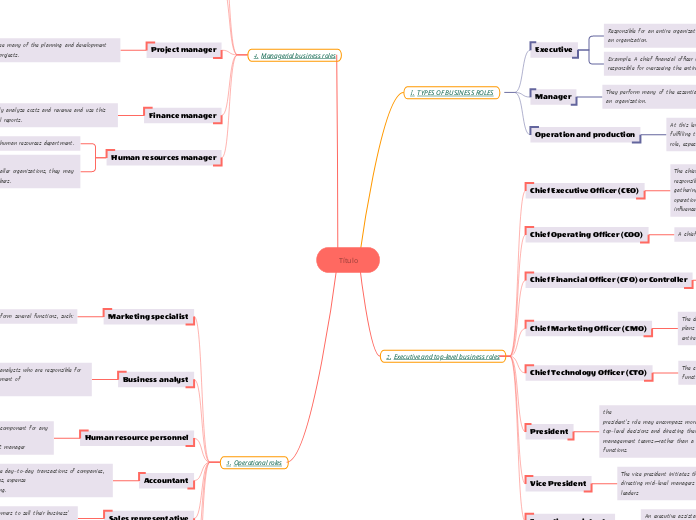Título
TYPES OF BUSINESS ROLES
Executive
Responsible for an entire organization or a large department within an organization.
Ex:ample. A chief financial officer (CFO) is
responsible for overseeing the entire financial department.
Manager
They perform many of the essential mid-level business roles within an organization.
Operation and production
At this level, business roles can encompass one or more professionals fulfilling the responsibilities of the same
role, especially in larger organizations.
Executive and top-level business roles
Chief Executive Officer (CEO)
The chief executive officer (CEO) of a company is the leading role responsible for making top-level decisions,
gathering resources that support the company and driving operational and structural changes that directly
influence organizational growth.
Chief Operating Officer (COO)
A chief operating officer (COO) oversees the company's operations.
Chief Financial Officer (CFO) or Controller
The chief financial officer (CFO), or controller, is responsible for the cash flow and the financial success of a
business.
CFO.
is responsible for finding investors and external funding opportunities to grow your business
Financial controller.
monitors company expenses and assets
Chief Marketing Officer (CMO)
The chief marketing officer (CMO) directs marketing campaigns, plans marketing budgets and manages the
entire marketing department of their company.
the CMO usually makes the final decisions
regarding
the development
implementation of various marketing projects.
Chief Technology Officer (CTO)
The chief technology officer (CTO) manages the technological functions of their organization.
integrate new technology trends
ensure any technology they introduce meets the needs of their company
President
the
president's role may encompass more defined tasks—like handling top-level decisions and directing their
management teams—rather than a broad range of executive functions.
Vice President
The vice president initiates the president's decisions and plans by directing mid-level managers and team
leaders
Executive assistants
An executive assistant usually reports directly to the CEO and handles much of the CEO's administrative tasks
Managerial business roles
Marketing manager
A marketing manager oversees the entire marketing department, depending on the size of the company
Product manager
Product managers analyze product markets and streamline processes related to product development.
Project manager
Project managers oversee many of the planning and development processes for business projects.
These
professionals
initiate
design
monitor
control
finalize projects.
Finance manager
Finance managers usually analyze costs and revenue and use this data to prepare financial reports.
Human resources manager
Human resources managers direct the human resources department.
They oversee large teams within the
human resources department, or in smaller organizations, they may be in charge of only a few staff members.
Operational roles
Marketing specialist
Specialists perform several functions, such:
as gathering customer data
researching target demographics
optimizing content for SEO purposes.
Business analyst
Many companies employ business analysts who are responsible for evaluating the growth and development of
the business.
This role analyzes market trends
projects future revenue.
develops plans that help businesses
track profitability
Human resource personnel
The human resources department is an essential component for any business, and the employees in this
department work under the supervision of the HR manager
Accountant
An accountant oversees the day-to-day transactions of companies, including sales transactions, expense
payments and tax reporting.
Sales representative
Sales representatives connect with customers to sell their business' products or services.
Customer service representative
Customer service representatives help customers solve problems, handle product returns and refunds and
resolve issues when customers are unsatisfied
Administrative assistant
The administrative assistant, office assistant or receptionist serves as the first point of contact for visitors and
clients entering the business.
Manage telephone lines.
Communicate between clients and partners.
Keep staff schedules organized.
